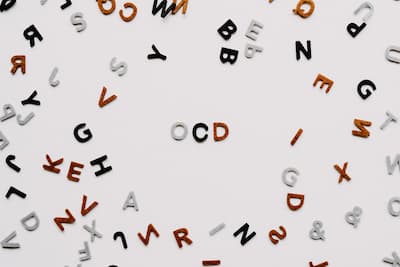OCD
Obsessive Compulsive Disorder (OCD) is a condition which involves obsessive thoughts and compulsive behaviours.
It is an anxiety disorder characterised by intrusive thoughts, uneasiness, apprehension, fear or worry and repetitive behaviours aimed at reducing the associated anxiety. People with OCD may recognise their obsessions and compulsions as irrational and may become further distressed by that realisation.
Sufferers may find themselves:
- Checking, counting or repeating things over and over again.
- Being compelled to carry out certain behaviours
- Worry obsessively about health or death of themselves and others
- Worry excessively about contamination by germs, chemicals or dirt
If you can answer yes to any of the above, then you may be suffering from OCD
The symptoms of OCD are intrusive by nature and can really affect everyday life. Symptoms are often exacerbated during times of high stress or anxiety. For some, even when not in the presence of the activating trigger, negative scenarios are imagined regarding the content of the obsession, creating yet more anxiety.
While everyone who suffers with OCD will do so in different ways, several characteristics are commonplace:
- Obsession – unwanted thoughts or urges enter the mind repeatedly causing distress e.g. I must wash my hands again or I will be contaminated.
- Anxiety – Intrusive and distressing thoughts raise our anxiety and cause even more negative thinking, until we find ourselves in an apparent unending cycle of negative thinking.
- Compulsion – Typically, there will be an urge or compulsion to carry out an action. This may be physical e.g., placement of items or mental e.g., counting.
- Temporary relief – In the mistaken belief that carrying out the action will prevent the worst from happening, there may be a temporary relief from anxiety. However, obsessional thoughts and anxiety soon return, and the cycle begins again.
Symptoms are often exacerbated during times of high stress. We may find OCD to be more debilitating when we are dealing with events which have no apparent connection. Symptoms may include excessive cleaning, repeated checking, extreme hoarding, preoccupation with sexual, violent or religious thoughts, aversion to particular numbers and nervous rituals, such as opening and closing a door a certain number of times before leaving a room.
No one is born with OCD and it should be a source of some comfort to the OCD sufferer that their mind, therefore, knows how not to be obsessive. The aim of hypnotherapy will, in the first instance, be to reduce the overall level of anxiety. When our anxiety is reduced, we move from the confines of the primitive, emotional mind (the subconscious mind) to the intellectual mind, where we can view our situation without emotion and see where and how we can make the changes necessary for our continued well-being. In doing so, we encourage our brains to produce more serotonin, which helps us to break the anxiety-obsession-compulsion cycle.
When is a trance state the subconscious is accessed – the part of the brain that drives the OCD responses. Since the subconscious mind is a deeper seated, more instinctive force than the conscious mind, this is the part which must change for our behaviour and physical state to alter. By accessing this part of the brain, we can calmly look at our responses and create new, informed decisions as to how to react in any given situation in order to deal with it more appropriately.
If you would like to find out how I can help you overcome OCD then please contact me today.

My Values & Beliefs
My Work Must Bring Positive Changes
I aim for the greater good and treating paitents with EMDR is my way of doing so. I will never force upon a person a negative experience and I will make an extreme amount of effort to not do so.
I Believe That EMDR Is The Quickest And Most Effective Method To Treating Trauma
Before I became a practitioner in EMDR I wanted to help people suffering from all types of trauma. Having found a way that is quick and precise, I trained extensively to deliver this method to help those who are in greater need than myself.
I Will Always Champion People Who Wish To Seek Help
Seeking help in itself is a daunting task to those with mental issues. I will never, ever, put a person down for seeking my help, or help in general. I will instill confidence and praise in my patients that go beyond their treatment as a personal goal, not a professional one.



“Needing help doesn’t have a look, but asking for it is always beautiful”
Brittany Burgunder
